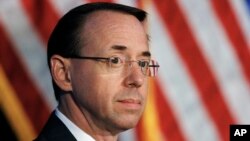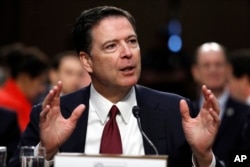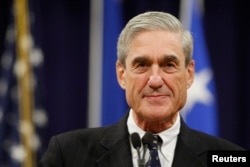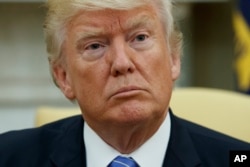With the White House casting doubts about reports that President Donald Trump is under investigation for obstruction of justice, questions have sprouted in recent days about whether the U.S. Justice Department official supervising the broader probe into Russian interference in the 2016 election must recuse himself.
The 11-month investigation of Russian meddling and possible collusion with Trump’s presidential campaign is being overseen by Rod Rosenstein, the Justice Department’s No. 2 official since late April, because Attorney General Jeff Sessions had previously recused himself -- stepped away from the probe because of his own meetings with Russia's ambassador to Washington.
Calls for Rosenstein to also remove himself from the investigation arose after Trump abruptly fired FBI Director James Comey last month, saying it was the deputy attorney general's recommendation that persuaded him to act. The president contradicted himself almost immediately, telling an interviewer the next day that he had decided to dismiss Comey regardless of Rosenstein's opinion.
Calls for recusal renewed
The pressure on Rosenstein to recuse himself escalated last week after The Washington Post reported -- and Trump appeared to confirm -- that investigators were examining whether Trump tried to impede the investigation when he fired Comey.
"I am being investigated for firing the FBI Director by the man who told me to fire the FBI Director!" Trump wrote on Twitter Friday, adding that he saw this as a "witch hunt."
One of the president's lawyers, Jay Sekulow, said Trump’s online comments about his involvement in the case should not be taken literally.
During multiple television appearances on Sunday, Sekulow said again and again that the president brought up what he called a "witch hunt" merely as a response to the Washington Post story, and that Trump's words were not an acknowledgement that he was under investigation.
Probe has widened
Trump was not a target of the investigation when it was first begun last July, but the scope of the probe appears to have broadened in the weeks since Comey's firing, and the likelihood that Rosenstein will be questioned remains high, leaving the deputy attorney general little choice but to recuse himself from his role in supervising the overall case.
Citing unnamed sources, ABC News reported Friday that Rosenstein had privately acknowledged to his Department of Justice colleagues that he may have to recuse himself from the Russia probe.
Department of Justice spokesman Ian Prior said Rosenstein has long insisted that, “If there comes a point when he needs to recuse, he will.”
“However, nothing has changed,” Prior wrote in a statement emailed to VOA.
Rules regulating special counsel
Under rules regulating the special counsel, Rosenstein does not supervise Mueller on a day-to-day basis but he has executive authority over how his investigation is carried out. For example, Rosenstein could ask for an explanation or justification of any part of the investigation, and “after review conclude that the action is so inappropriate or unwarranted under established departmental practices that it should not be pursued.”
Writing on the Lawfare Blog on Friday, Harvard Law School Professor Jack Goldsmith and Benjamin Wittes, a senior fellow at the Brookings Institution, argued that the “substance of the investigation has apparently developed to include a potential obstruction of justice focus on the president," making Rosenstein's continued involvement "untenable."
Peter Zeidenberg, a former federal prosecutor now a partner at the Arent Fox law firm in Washington, agreed that Rosenstein has to recuse himself “because I think he is clearly going to be a witness in a potential obstruction investigation.”
But others remain skeptical that Rosenstein's role in Comey's dismissal was deep enough to warrant his testimony.
Trump's tweets 'hardly a serious basis'
Georgetown University law professor Marty Lederman said Trump’s tweet “is hardly a serious basis for believing that Mueller is investigating Trump for firing Comey."
On the contrary, “the more reasonable assumption is that if Trump tweeted it, it must be nonsense,” Lederman wrote in the Just Security blog.
Nevertheless, he agreed that Rosenstein would have to recuse himself if he is summoned as a fact witness in the investigation.
John Malcolm, a former prosecutor now with the Heritage Foundation in Washington, said he doesn’t see Rosenstein as an indispensable witness.
“Certainly, if he were implicated in the investigation to something beyond a witness, then of course he’d have to recuse himself,” Malcolm said. “But if all he’s going to do is to say, ‘I wrote a memorandum, and I gave that memorandum to the president, and I told him that was my advice,’ I don’t see any reason at that point why he’d become so entangled in this investigation where his credibility would become so much an issue that it would be somehow unfair for him to oversee it.”







